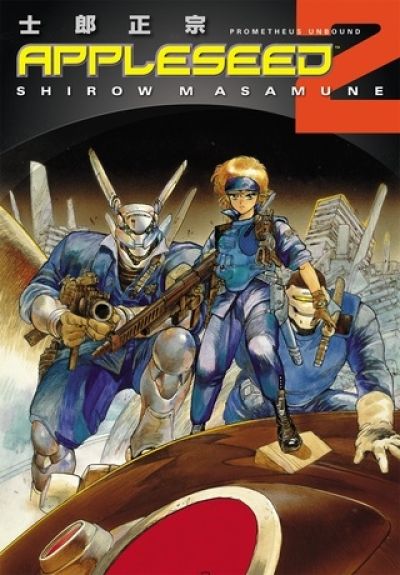Trouble in Paradise
Prometheus Unbound (Appleseed, volume 2)
By Masamune Shirow

14 Oct, 2015
0 comments
Appleseed Book Two: Prometheus Unbound picks up where The Promethean Challenge left off. While Briareos Hecatonchires recovers from the injuries he suffered in the previous volume, Deunan Knute is trying to fit into a police force made up of former cut-throats barely distinguishable from the criminals they oppose. She’s soon head-hunted by ESWAT (Extra-Special Weapons and Tactics), less for her remarkable skill set and more because the powers-that-be (or a faction thereof) want her somewhere where they can keep an eye on her. Deunan has, as she discovers, a closer connection to the founders of Olympus than she had ever suspected.
The people running Olympus (the city) and Aegis (the world government it heads) have bigger problems than one survivor from badside. The world war was horrible, but it did allow Aegis time to consider and address the issues driving humans towards global suicide. Not enough time, it seems, which leads the Council, bioroids all 1, to consider a bold strategy: apply bioroid discipline to all humans. The result may not be human as humans of the 22 nd Century define it, but at least it and the world it inhabits will be alive.
Interestingly, it’s not the humans who object to this scheme. It’s Athena, Aegis’ senior politician and a bioroid herself.
Athena finds it easy enough to deal with the council: detain them all. While they are in detention, Athena and her subordinates run the proposal through Gaea, the city’s supercomputer. Normally the council is plugged into Gaea while it cogitates, but obviously that won’t work in this case. The vast, cold intellect is free to consider the issue without human or bioroid moderation.
What could go wrong?
Gaea does not think as biological intelligences do, but it does have its loyalties. Ultimately, Gaea exists to protect the human race. If Aegis, Olympus, and the bioroids have become humanity’s enemy, then absent the moderating influence of the Council, Gaea will not hesitate to eliminate the threat to its precious humans, using whatever tools come to hand.
A heavily wired city like Olympus offers Gaea so many tools: the giant gun platforms, intended for use against exoskeleton-using criminals but easily repurposed. Bioroids vulnerable to hypnotic suggestion. Re-programmable robots.
A nuclear plant, perfectly sited to do for Olympus what Chernobyl did for Pripyat.
As Deunan and her allies discover, Gaea has a number of vulnerabilities, but the machine is also very adaptable. Each human victory is met with a new attack from the computer. The ultimate answer is to shut Gaea itself down; this won’t be easy and failure will mean the destruction of the city and potentially the new world order over which it rules.
~oOo~
Not to be overly negative but the role Deunan gets to play in the final sequence seemed awfully contrived. That, and the various back-doors into Gaea, suggest that the people who designed the computer and the city around it had watched far too many video games.
The first volume didn’t have too much zeerust; mainly it was the absence of technology now common, which is harder to notice (and who is to say people didn’t stop carrying cell phones once the other side started using their GPS functions to target artillery?). This volume, alas, has details like supercomputers built on the scale of a Forbin Project, huge, hulking CRT monitors, and mobile phones large enough that a desperate Canadian could use one to beat a moose to death.
Shirow does realize (as so many authors have not) is that while it is nice to have awesome mechanical parts (visible, as it is the fashion to display them), prostheses cannot heal as can the original organic parts. Maintenance costs money. Even diagnostics can cost big money, an overhead which keeps cyborgs like Briareos tied to the city with chains of gold and silver.
While that detail is plausible, I am afraid that Shirow’s grasp of human and bioroid anatomy is somewhat less convincing. He’s much better at loving depictions of inanimate objects like firearms and machinery.
This is either surprisingly talky for a shoot-em-up or oddly violent for a philosophical parable. Various characters discuss the challenges facing the world: how to balance human desires with global needs, whether it is right to change human nature, and so on. Then, having generally failed to convince each other of anything 2, the guns come out. I guess that’s a system with lots of historical precedent, but it seems very inefficient.
On a more positive note, casual police brutality is shown to be counter-productive. Now, the specific incident that shows us this is a robot cop smushing a criminal into goo, which may be a trifle more violent than necessary. However, now I know that the cops do have limits. Good for them. Plus, Deunan has the chance to shoot a friend in the face during an arrest, but refrains from doing so. This is more compassion than she managed in the first book. I guess life in the city is turning her into a big softy.
Appleseed Volume 2: Prometheus Unbound is available from Dark Horse.
1: Gene-mod clones, with cybernetic add-ons and a lifetime of firm discipline. Which includes, for some reason, conditioning to think of themselves as non-humans.
2: The philosophical discussions always seem rich in excluded middles, which may contribute to the futility of discussion as a way to create consensus in this setting. The council is particularly unpersuasive. IMHO, the problem is their habit of segueing from reasoned debate into screaming slogans at the people they are trying to persuade.
